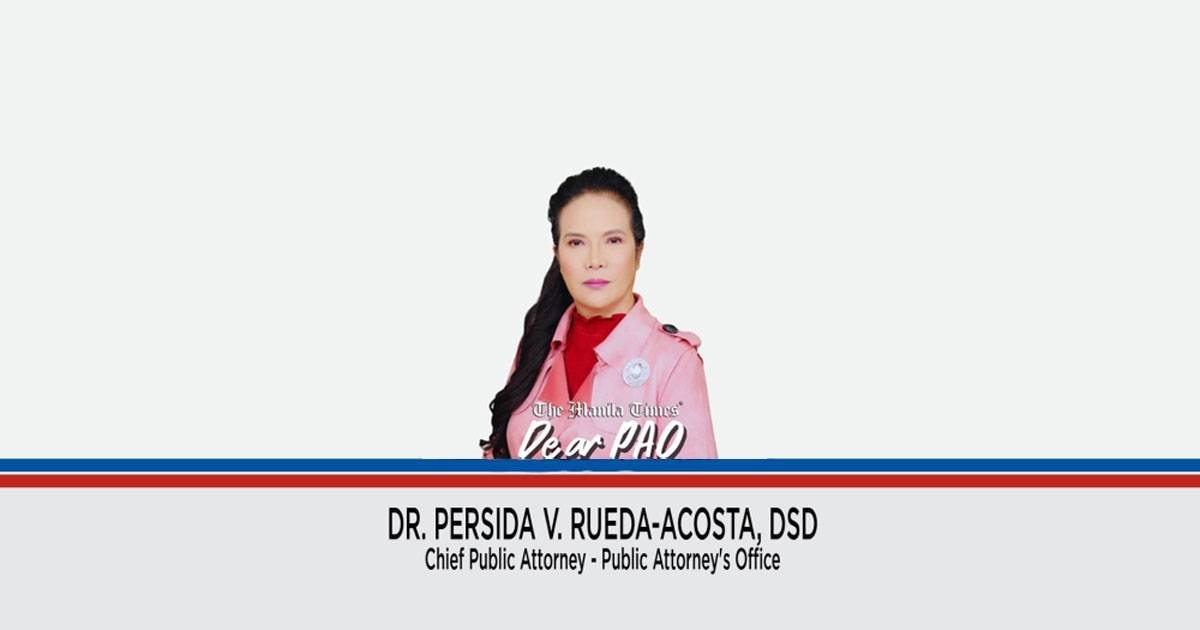
Dear PAO,
My father, after a few years of working abroad as an OFW, was able to buy a property in Metro Manila. The property’s title was registered under my father’s name. Consequently, upon his return to the Philippines, he was surprised to learn that said property was occupied by tenants. Following a peaceful talk with the alleged landlord-owner, the latter voluntarily surrendered the property to my father. My father, then, allowed the tenants to continue occupying the property. However, upon my father’s return abroad, the landlord forcibly evicted our tenants, and changed the padlocks. He argued that he has all the rights to forcibly enter our property and lock it because he is the owner. Is he correct?
John
Dear John,
One who claims ownership over a property may not take the law into her/his hands by forcibly evicting the actual occupants therein. This was explained by the Supreme Court in the case of Esperal v. Trompeta-Esperal, GR 229076, Sept. 16, 2020, penned by Associate Justice Henri Jean Paul Inting, where it held that:
“Records reveal that petitioner was able to satisfactorily prove by preponderance of evidence the existence of all the elements of forcible entry. While it may be true that respondents occupied the property before 2012, it was without the knowledge of petitioner and respondents voluntarily left the premises after the latter learned of petitioner’s ownership. More importantly, petitioner was already in prior peaceful occupation of the subject property when respondents forcibly entered it by using a bolt cutter, evicted the tenants therein, changed the padlocks, and placed a rent signage in front of the property. These were the acts of respondents that prompted petitioner to file a forcible entry case.
“Respondents, on the other hand, countered that their entitlement to possession over the subject property is based on their ownership rights as evidenced by an Affidavit of Acceptance for the Foreclosure of the Mortgage of Real Property dated March 15, 2005 executed by Pablo. The Court stresses that the issue of ownership in ejectment cases is to be resolved only when it is intimately intertwined with the issue of possession to such an extent that the question of who had prior possession cannot be determined without ruling on the question of who the owner of the land is. Contrary to the conclusions of the RTC, the Court deems it inappropriate for the ejectment court to dwell on the issue of ownership considering that respondents’ claim of ownership could not establish prior possession at the time when the subject property was forcibly taken from petitioner.
“Regardless of the actual condition of the title to the property, a person in possession cannot be ejected by force, violence or terror, not even by the owners. Assuming arguendo that herein respondents are the real owners of the subject property, they had no right to take the law into their own hands and summarily or forcibly eject petitioner’s tenants from the subject property. Their employment of illegal means to eject petitioner by force in entering the subject property by destroying the locks using bolt curt replacing the locks, and prohibiting the tenants to enter therein made them liable for forcible entry since prior possession was established by petitioner.” (Underscore provided)
Applying the aforementioned decision to your case, it is clear that the landlord, who claims ownership over a property registered under your father’s name, may not forcibly enter the disputed property and change its padlocks. His remedy is to resort to court action in order to recover possession of the property, and to legally evict the occupants therein.
We hope that we were able to answer your queries. Please be reminded that this advice is based solely on the facts you have narrated and our appreciation of the same. Our opinion may vary when other facts are changed or elaborated.
Editor’s note: Dear PAO is a daily column of the Public Attorney’s Office. Questions for Chief Acosta may be sent to [email protected]







